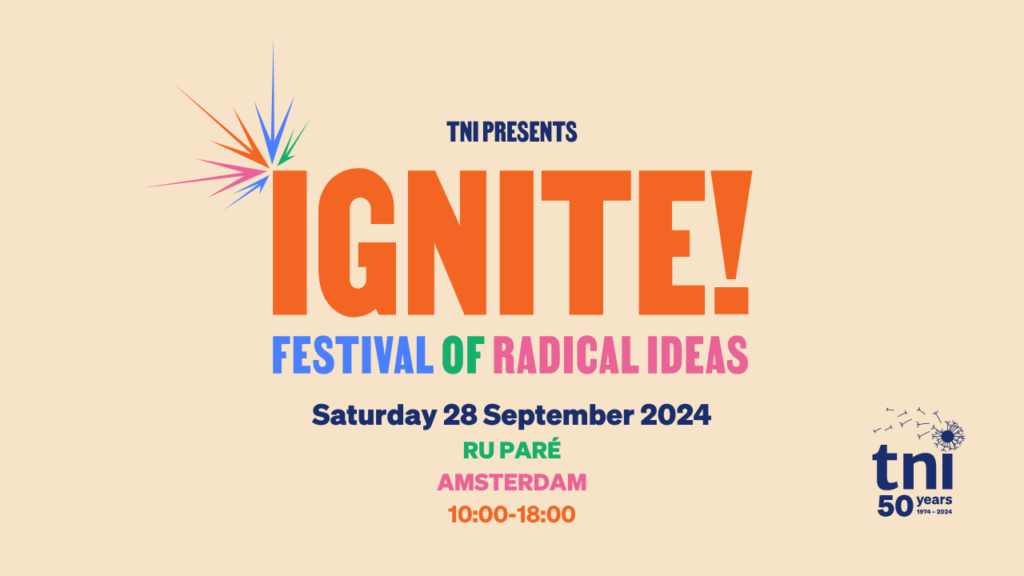28 september, Amsterdam: “Ignite, festival of radical ideas” – viering van vijftigjarig bestaan van Transnational Institute (workshops)

In het kader van haar vijftigjarig bestaan organiseert het Transnational Institute (TNI) op dag twee van “Ignite, festival of radical ideas” in Ru Paré in Amsterdam een achttal workshops, te weten: “Migration: from walls to bridges”, “From militarism to collective safety: stopping the endless rush to war”, “From farmers’ protests to emancipatory rural futures”, “Post-growth and decolonization: towards an equitable and sustainable planet”, “Energy transitions: from big oil to decolonial and democratic public power”, “Palestinian solidarity from Asia to the Americas”, “Understanding fascism and the rise of the far-right”, en “From neoliberalism to a vew international economic order”.
Zaterdag 28 september
Van 10:00 tot 18:00 uur
Ru Paré
Chris Lebeaustraat 4, Amsterdam
Uit de Engelstalige toelichting op de workshops:
“1. Migration: from walls to bridges
How are private companies benefitting from anti-migration politics and sometimes even driving them? What consequences do ‘smart’ borders and biometric surveillance have for people on the ground? How can we resist the tide of hatred against people on the move at city level and change the narrative towards welcoming people on the move?
2. From militarism to collective safety: stopping the endless rush to war
How do we stop the relentless rush to war? What are our answers/vision of collective security? How militarism attempts to forge a European nationalism vs Russia/China, the other (migrants, Muslims, etc). What are other underlying agendas eg. competition over resources, who leads the next phase of capitalism ie green/digital technologies?
3. From farmers’ protests to emancipatory rural futures
Is climate action and farming incompatible with each other? How do we address climate action and strengthen family farming? How do we undermine or replace industrial agriculture and build an alternative that is sustainable and accessible to all?
4. Post-growth and decolonization: towards an equitable and sustainable planet
The industrialized world has surpassed most ecological planetary boundaries, while the race for critical raw materials is pacing up. Which old and new forms of economic subordination, exploitation and colonization are we witnessing today? How can post-growth contribute to decolonize these structures while providing for sustainable and equitable development across the globe?
5. Energy transitions: from big oil to decolonial and democratic public power
Can green capitalism save the world or do we need public power pathways? And how do we build an energy system that doesn’t replicate patterns of colonial extractivism? Together with excellent contributors, we will dive into the geopolitics of the global energy economy, just transition organising learnings and anti-extractive industrial policy. The goal: sharpening strategies to achieve public energy transitions that are decolonial and democratic.
6. Palestinian solidarity from Asia to the Americas
What does the genocide in Gaza reveal about national, regional, global politics? How can we break the complicity and advance an anti-colonial agenda worldwide? This session we will bring together a panel of speakers from different continents to hear about different experiences, challenges and successes of the Palestinian solidarity movement across the globe.
7. Understanding fascism and the rise of the far-right
Why is the right on the rise everywhere? What are the underlying causes and the reasons for their success? How has the far-right succeeded at building its presence online? What can we do to confront the right and offer a visionary progressive alternative?
8. From neoliberalism to a new international economic order
In this time of global fractures, what are the opportunities and challenges for building a more just international economic order? What power is shifting globally and what isn’t? Which economic and financial reforms are needed to foster a just transition for all countries? Which proposals from the South are emerging?”
Harry Westerink
